- Home
- Stephanie Laurens
In Pursuit Of Eliza Cynster Page 17
In Pursuit Of Eliza Cynster Read online
Page 17
Which was a relief. Inside he was panicking enough for them both.
Next time he felt that prickling sensation on the back of his neck, he would react a lot sooner.
He jabbed at the map. “Those”— lifting the same finger, he pointed to the purplish hills that rose, a backdrop to the fields directly behind the village —“must be the Pentland Hills. If we continue along the lane we took to the church, we’ll head toward them, but according to the map the lane will end soon, and after that, there’s nothing but hills, not until we cross them.”
Eliza was following, searching the map for what lay further on. “But once we cross the hills, there’s a highway — no, two highways on the other side.” After a moment of looking further afield, she said, “Penicuik is a fairly large town on a highway. Surely we’ll be able to get a gig there, and then we can drive to Peebles, and we’ll be back on the route we originally planned to take to Wolverstone.”
But they would be a day late. This, however, was not the time to discuss that, not with the laird all but breathing down their necks.
“Right.” Jeremy caught her eyes. “Are you game to try walking across the Pentland Hills?”
Her chin firmed. The look on her face reminded him that she was a Cynster through and through. “I am not going to wait here until the laird catches up with us.” Eyes sparking, she raised her head and swung toward the stairwell. “Let’s go.”
Hurriedly stuffing the map back into his saddlebag, he swung the bag up to his shoulder as he stalked, grim-faced, after her; catching her up before the open door, he grasped her arm, drew her back, and went down the stairs ahead of her.
There was no danger lying in wait in the church foyer.
“He’ll be nearing the first cottages.” Hauling open the church door, he looked back toward the highway, saw with relief that bushes along the edge of the graveyard screened them from view.
Stepping out onto the path, he waved Eliza ahead of him. After one glance toward the highway, she strode, all but ran, down the path, around the back of the church, down to a side gate, then stepped through into the lane once more.
He joined her. After one last glance back toward the highway, they walked quickly, side by side, away from civilization toward the looming Pentland Hills.
A little way along the lane curved, hiding them completely from anyone on the highway. They exchanged a glance, then lengthened their strides.
It wasn’t easy going.
The lane had petered out not all that far from the church. They’d pushed through a low hedge and into the field beyond and continued on, pausing every now and then to mark the higher line of the hill and look back at the church tower, the landmarks they were using to keep their course.
Eliza gave fervent thanks she was wearing breeches and boots; had she been in a gown, she would have been staggering. The freedom of male attire had a great deal to recommend it; each stride in her boots would have taken two or even three had she been restricted by skirts.
As the ground rose, they encountered banks of heather. Although not yet in bloom, the bushes were abundant and plentiful. Sheep tracks wended through the thick masses, but her and Jeremy’s direction did not always match those of the sheep.
Halfway up the first ridge, they came to a stream. At Jeremy’s suggestion, they walked along the bank a little way and found a place where rocks set in the bed allowed them both to cross easily enough.
Without wasting breath on words, she slogged on. Jeremy kept pace alongside, occasionally pausing to glance back and check their direction.
The way grew steeper. Harder. Determined not to whine or give any hint of censure, she set her jaw and walked on, ignoring the unaccustomed heat, the burning sensation in her thighs, her calves.
She was completely as one with Jeremy on the need to flee the laird, and as, thanks to her, they had no other option but to do so on foot, she was not going to let a single word of complaint pass her lips.
Reaching the top of the ridge, she bent from the waist, braced her hands on her thighs, hung her head, and tried to catch her breath.
After a moment of unladylike wheezing, she felt the weight of the saddlebag, still over her shoulder, ease.
“Let me take that.”
Feeling her legs wobble, she staggered to a flat rock and collapsed upon it.
Jeremy stood just below the ridge, far enough below so he wouldn’t be outlined against the sky should anyone think to look. He set the saddlebags by his feet, then drew out their map again.
After a moment of consulting it, he glanced at Eliza and saw her staring onward, across the shallow valley before them.
The look on her face was horrified. “Good God — that was only the first ridge.” Turning to him, she demanded, “How many are there?”
“Only one other.” He nodded at the ridge before them. “That one. Once we’re over that, it’s all downhill.”
“Thank God for small mercies.”
Hiding a wry smile at her faint voice, he looked again at the map. “We’re heading in the right direction.” Glancing across the shallow valley, he gauged the distance, then looked over his shoulder at the western sky. “The light’s already fading, and as we go further into the valley, we’ll be descending into shadow.”
“Can we get over the next ridge before nightfall?”
“I don’t think so, and this isn’t the sort of country to go walking through at night.” He scanned their surroundings. “We need to start looking for shelter.”
The one aspect of their flight they still hadn’t discussed.
Yet instead of embarking on recriminations, something Jeremy had steeled himself to hear, Eliza sighed and pushed up from her rock. “Let’s start walking and look about us while we do. I can’t see any roof at present, but there must be huts, or cottages, or something around here.”
He had a suspicion “something” would be the best they would find, but as she’d already started off, he hefted the saddlebags, settled one on each shoulder, and followed her down the slope.
When the laird reached the village of Ainville without sighting his quarry, he drew rein on a curse.
“Damn. I’ve lost them.”
Hercules paid no heed.
Sitting the horse in the gathering gloom, the laird mentally reviewed the miles between Ainville and the last news he’d had of the pair. The stableman at Currie hadn’t seen which way they’d gone, but given they’d been heading south, the laird had continued in that direction, but had learned of no other sightings along the road.
He’d stopped and asked at every inn, but no one had had any tidings of any kind.
It was possible some coach had halted and they’d persuaded the occupants to take them up.
But he’d ridden steadily, especially over the last long, straight, very empty stretch of road. A coach would have to have been rattling along for him not to have caught even a glimpse of it ahead of him.
Unless the coach had turned off the main road, but intersecting lanes were few and far between along this particular road.
An inn lay just ahead. Deciding that night was too close upon him to continue further pursuit that day, he nudged Hercules into a walk and headed for the stable yard.
Tomorrow, he’d have to backtrack and inquire about coaches and carriages that might have taken the pair up.
The inn proved to be surprisingly comfortable. Leaving his bag by the stairs, he walked into the tiny tap and had the barkeep pull him an ale.
Leaning on the counter, he glanced idly around and saw an old man, wrapped in knitted shawls and with a plaid cap covering his bald head, tucked in a corner of the bay window, looking out at the road.
The old man’s head was bobbing, but his eyes were open, his gaze, when it flicked briefly the laird’s way, alert.
Picking up the mug of ale the barkeep placed by his elbow, the laird nodded at the old man. “What’s his drink?”
“Porter.”
“Give me a mug for him.”
The barkeep grinned and complied.
Carrying the mug of porter as well as the mug of ale, the laird walked to the table before the window.
The old man looked up, dark eyes bright in a wrinkled face.
“For you.” The laird set down the porter.
The old man considered him for a moment, then reached for the mug and nodded to the bench on the other side of the table. “Thank you, m’lord.”
The laird sat, stretched out his long legs, then took another draft of the ale.
After taking two sips of porter, all the while regarding the laird over the rim of the mug, the old man chuckled. “So, what can I do for you?”
The laird smiled. “You can tell me what you saw this afternoon. I’m trying to catch up with two acquaintances who were supposed to have traveled down this way today, but I fear I’ve missed them. Then again, they might have hailed some carriage and been taken up, and so still be ahead of me.”
The old man nodded his understanding, sipped again. “Well, you must have missed them along the way, because since noontime, no one — on horse or in any sort of carriage, not even on foot — has passed this window.”
“Thank you.” The laird inclined his head. He stayed chatting to the man, exchanging the usual countryman’s news, until he’d drained his mug, then, with a polite nod, he rose and headed for his room.
A good dinner, a decent night’s sleep, then tomorrow he’d backtrack and find his quarry’s trail.
Tracking was an accomplishment at which he excelled, and unless he missed his guess, his fleeing pair had resorted to shank’s pony. On foot, they’d be easy enough to track, easy enough to come up with.
And then he would observe, and see what he could see.
Chapter Eight
he light was failing, and Eliza was starting to believe they would be sleeping on the open ground when Jeremy, walking half a pace ahead of her, halted and put out a hand to stop her.
Glancing up through the dimness, she saw he was peering toward a stand of trees ahead of and to the right of their path.
“Is that a roof?”
She peered, too. After a moment, she made out a patch of what might have been gray tiles, a shadow of a different quality in the gloom beneath the trees. “I … think it is.”
Jeremy surveyed the shallow valley into which they were descending. “I can’t see any other habitation of any kind. This whole valley looks deserted.”
Eliza nodded toward the copse. “Except for that roof and whatever’s beneath it.”
He looked again at the trees. “It might be a woodcutter’s cottage. Those trees look like they’re managed for firewood. Let’s take a closer look.” He stepped off the path and headed for the trees.
She followed. “What if the woodcutter’s there?”
“We’ll ask if we can share his cottage. But”— he peered between the boles —“I can’t see any sign of life. No light, and it’s dark enough anyone inside would have lighted a candle by now.”
They picked their way through the thick blanket of leaves, twigs, and branches littering the ground beneath the trees. Signs of recent logging could be seen here and there, but the closer they got to the cottage the more certain he was that it lay empty. “Most likely the woodcutters only stay here while they’re harvesting the logs. This land and the copse probably belong to some nearby estate.”
Eliza didn’t reply but stayed close behind him, her hand occasionally brushing the back of his coat.
He was acutely aware of her nearness, and of them being together, alone in the wilds with no chaperon of any description in sight, but in that moment his newfound protective instincts were simply reassured knowing that she was near.
They had to circle to descend into the dip in which the cottage stood. A small, doubtless single-roomed abode fashioned of rough stone and split logs, it nestled against the rising hillside behind it, protected by both the hill and the thick trees all around.
At the edge of the small clearing before the cottage, he paused and scanned the shuttered windows again. Detecting no sign of life, he cautiously crossed to the door.
He knocked once, then again.
No answer came.
Exchanging a glance with Eliza, he shrugged, grasped the latch, lifted it, and opened the door. Pushing it wide, in what little light remained to penetrate the dimness, he took stock.
Eliza peered past him, then stepped across the threshold and walked into the tiny cottage. “It looks neat and quite clean.”
“Almost certainly an estate cottage.” Spying a candle in a simple holder on a shelf by the door, he lifted it down, then, seeing no tinderbox, hunted in his pockets for his own.
Outside, the last of the daylight died, and night fell like a blanket around the cottage.
The candle flickered, then flared to full life; once the flame settled, he raised the candlestick and took inventory of their surroundings.
A roughly made dresser stood against the wall opposite the door. Two wooden crates of logs and kindling sat on either side of the narrow hearth. A small square table took up the middle of the floor, with three simple wooden chairs set about it. On the far side of the cottage, filling the quadrant furthest from the door, lay a straw-filled pallet covered by coarse blankets.
Eliza had halted looking down at the pallet; taking off her hat, she turned and sat, sinking down. She leaned down and sniffed. “The straw smells fresh.”
He managed to keep his voice even, his tone bland. “The woodcutters probably come up here once a month or so, at least during the summer. We must have just missed them.”
Her brows arched fleetingly. “That’s just as well.”
Walking forward, he set the candlestick on the table, then shrugged off the saddlebags and set them over the backs of the chairs. His gaze fell on a metal pitcher sitting on the dresser. “I saw a well outside.” Picking up the pitcher, he walked back out.
Eliza followed him to the door. She watched as he crossed to the tiny stone-sided well, then went to join him. “I’ll hold the pitcher. You haul the bucket.”
“All right.”
She took the pitcher from him, waiting while he let the bucket down on its rope and more slowly hauled it back up, then she held the pitcher for him to fill.
Leaving him to empty and reset the bucket, she carried the pitcher back to the cottage, found metal mugs, and filled one for each of them.
Jeremy reentered the cottage to see Eliza seated at the table, sipping cold water, eyes closed, and a blissful expression on her face.
Hearing him, she opened her eyes and smiled. “This might as well be the finest wine.”
His mouth dry, he managed a grin, then turned to shut the door. Seeing an iron bolt set above the latch, he slid it home with some relief. At least no one could sneak up on them during the night.
“Thank goodness Meggin insisted on packing some food.” Setting down her mug, Eliza opened one saddlebag and rummaged inside.
“What have we got?” Jeremy opened the other bag.
Between them, they unearthed a passable repast of rolls, cold chicken, cheese, and figs. There was also an apple each, but they decided to save those for the morning.
With the candle between them, they sat on the chairs and ate, listening to the light wind playing through the branches outside. An owl hooted.
The food gone, still they sat, sipping the last of their water.
Peace, an aura of stillness and quiet, of comfort and safety, enveloped them; Eliza sensed it, felt it, knew she wouldn’t have if he hadn’t been sitting opposite her.
She glanced at him, and their gazes met.
Held.
All too aware of the subject she — and presumably he, too — was avoiding, she cut her gaze to the empty fireplace. “Should we light a fire, do you think?”
Her body was exhausted, her mind in no fit state to discuss the social ramifications of them spending the night alone.
After a fractional hesitation, he replied, “We coul
d, but if the laird is anywhere near, the smoke might lead him this way.”
“True, and it’s not really cold.”
“It would be best not to.”
That settled, she sighed wearily and rose, feeling twinges in her thighs and calves. “If I don’t lie down soon, I’ll fall asleep where I stand.” She turned to the straw pallet, their makeshift bed.
He rose, too. “You take the bed. I’ll —”
“Don’t be nonsensical.” Swinging to face him, she heard the sharp edge to her words but made no attempt to soften it. “I hate it when people insist on being unnecessarily self-sacrificing, especially on my behalf.” Dropping onto the bed, she fixed him with a challenging look and waved at the pallet. “This could sleep three with space to spare, and we’re both fully clothed. And cloaked, too. There’s more than enough space for us both to lie down, and there’s nowhere else you can sleep. We’ll have to walk again tomorrow, and there’s no telling what we might need to do, so you’ll need to be at your best, which means you’ll need your sleep.” She held his steady gaze uncompromisingly, fractionally tilted her chin. “I rest my case.”
His lips, until then set in a noncommittal line, kicked up at the ends before he straightened them. Still standing by the table, he hesitated, frowningly considering her, then lightly grimaced. “All right.” Picking up the candlestick, he came around the table. Waved at her. “You take the side closer to the wall.”
Further from the door in case anything comes through it.
Jeremy kept the words to himself, grateful when, without further argument — indeed, probably because she considered she’d won that round — she shifted across, then stretched out full length on the far side of the bed.
Setting the candle a safe distance from the bed, he sat, went to pull off his boots, then decided against it. If he was called on to defend them, he would need to be ready instantly. Without glancing at her, he murmured, “Good night,” and blew out the candle.
“Good night.” Her voice came through the ensuing darkness. She already sounded sleepy.

 Lady Osbaldestone’s Plum Puddings: Lady Osbaldestone’s Christmas Chronicles Volume 3
Lady Osbaldestone’s Plum Puddings: Lady Osbaldestone’s Christmas Chronicles Volume 3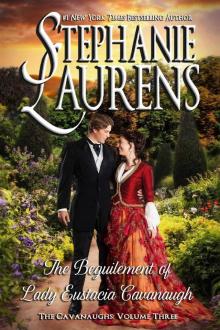 The Beguilement of Lady Eustacia Cavanagh: The Cavanaughs Volume 3
The Beguilement of Lady Eustacia Cavanagh: The Cavanaughs Volume 3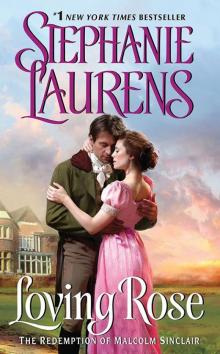 Loving Rose: The Redemption of Malcolm Sinclair (Casebook of Barnaby Adair)
Loving Rose: The Redemption of Malcolm Sinclair (Casebook of Barnaby Adair)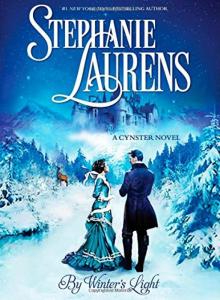 By Winter's Light
By Winter's Light Devil's Bride
Devil's Bride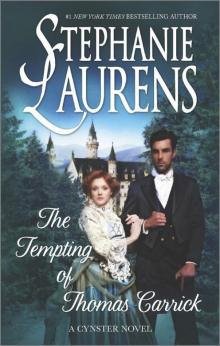 The Tempting of Thomas Carrick
The Tempting of Thomas Carrick![Cynster [22.00] A Match for Marcus Cynster Read online](http://i1.bookreadfree.com/i/03/16/cynster_[22_00]_a_match_for_marcus_cynster_preview.jpg) Cynster [22.00] A Match for Marcus Cynster
Cynster [22.00] A Match for Marcus Cynster All About Love c-6
All About Love c-6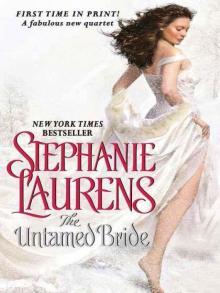 Cobra 01 The Untamed Bride
Cobra 01 The Untamed Bride A Lady of Expectations and Other Stories
A Lady of Expectations and Other Stories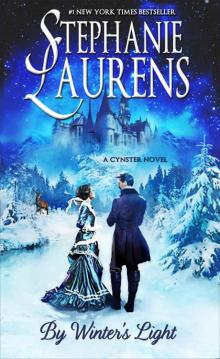 By Winter's Light_A Cynster Novel
By Winter's Light_A Cynster Novel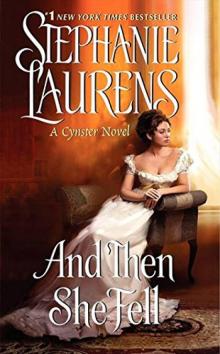 And Then She Fell
And Then She Fell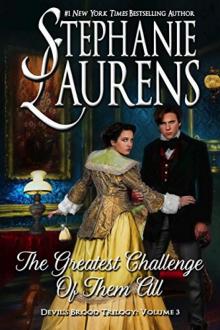 The Greatest Challenge of Them All
The Greatest Challenge of Them All The Edge of Desire
The Edge of Desire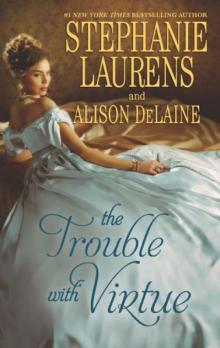 The Trouble With Virtue: A Comfortable WifeA Lady by Day
The Trouble With Virtue: A Comfortable WifeA Lady by Day Fair Juno
Fair Juno THE LEGEND OF NIMWAY HALL: 1750 - JACQUELINE
THE LEGEND OF NIMWAY HALL: 1750 - JACQUELINE Four In Hand
Four In Hand The Reckless Bride
The Reckless Bride Stephanie Laurens Rogues' Reform Bundle
Stephanie Laurens Rogues' Reform Bundle The Untamed Bride Plus Black Cobra 02-03 and Special Excerpt
The Untamed Bride Plus Black Cobra 02-03 and Special Excerpt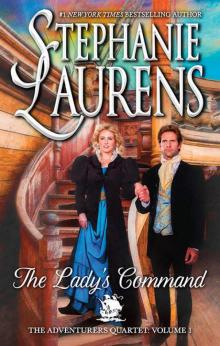 The Lady's Command (Adventurers Quartet #1)
The Lady's Command (Adventurers Quartet #1)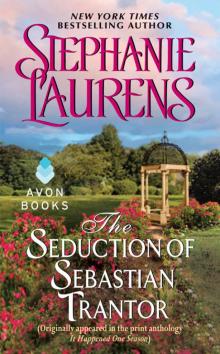 The Seduction of Sebastian Trantor
The Seduction of Sebastian Trantor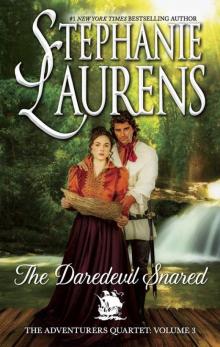 The Daredevil Snared (The Adventurers Quartet Book 3)
The Daredevil Snared (The Adventurers Quartet Book 3)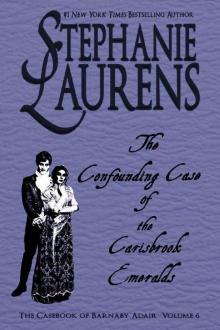 The Confounding Case Of The Carisbrook Emeralds (The Casebook of Barnaby Adair 6)
The Confounding Case Of The Carisbrook Emeralds (The Casebook of Barnaby Adair 6) Lord of the Privateers (The Adventurers Quartet)
Lord of the Privateers (The Adventurers Quartet)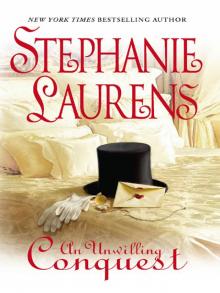 An Unwilling Conquest
An Unwilling Conquest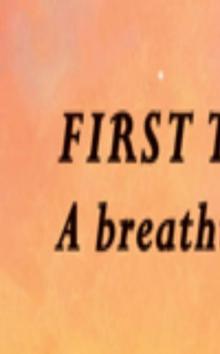 Brazen Bride
Brazen Bride On a Wild Night
On a Wild Night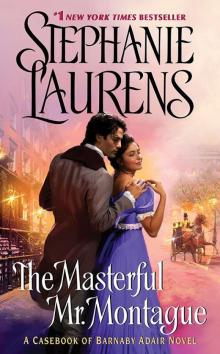 The Masterful Mr. Montague: A Casebook of Barnaby Adair Novel
The Masterful Mr. Montague: A Casebook of Barnaby Adair Novel Lord of the Privateers
Lord of the Privateers Royal Bridesmaids
Royal Bridesmaids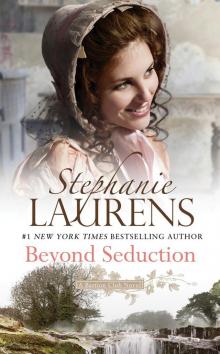 Beyond Seduction
Beyond Seduction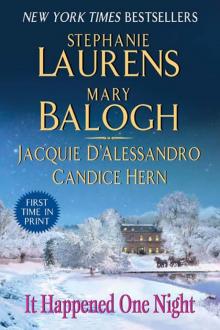 It Happened One Night
It Happened One Night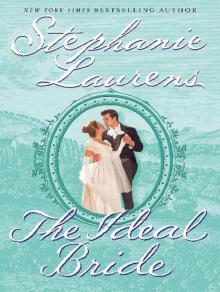 The Ideal Bride
The Ideal Bride The Promise in a Kiss
The Promise in a Kiss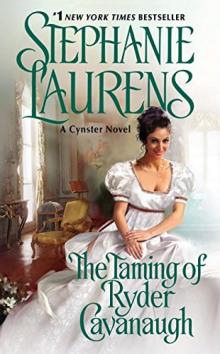 The Taming of Ryder Cavanaugh
The Taming of Ryder Cavanaugh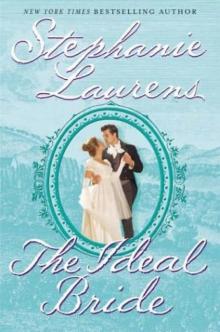 The Ideal Bride c-12
The Ideal Bride c-12 All About Love
All About Love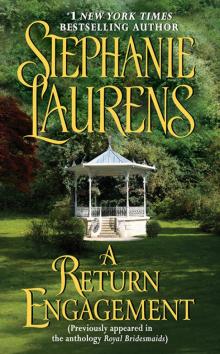 A Return Engagement
A Return Engagement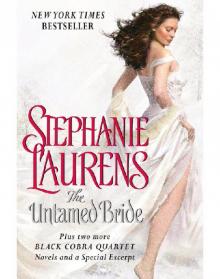 The Untamed Bride Plus Two Full Novels and Bonus Material
The Untamed Bride Plus Two Full Novels and Bonus Material Viscount Breckenridge to the Rescue
Viscount Breckenridge to the Rescue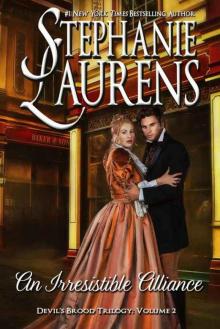 An Irresistible Alliance (Cynsters Next Generation Novels Book 5)
An Irresistible Alliance (Cynsters Next Generation Novels Book 5) The Daredevil Snared
The Daredevil Snared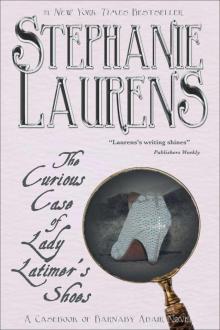 The Curious Case of Lady Latimer's Shoes: A Casebook of Barnaby Adair Novel
The Curious Case of Lady Latimer's Shoes: A Casebook of Barnaby Adair Novel A Lady of Expectations and Other Stories: A Lady of ExpectationsThe Secrets of a CourtesanHow to Woo a Spinster
A Lady of Expectations and Other Stories: A Lady of ExpectationsThe Secrets of a CourtesanHow to Woo a Spinster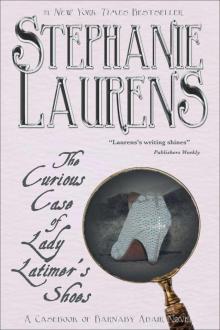 The Curious Case of Lady Latimer's Shoes: A Casebook of Barnaby Adair Novel (The Casebook of Barnaby Adair)
The Curious Case of Lady Latimer's Shoes: A Casebook of Barnaby Adair Novel (The Casebook of Barnaby Adair)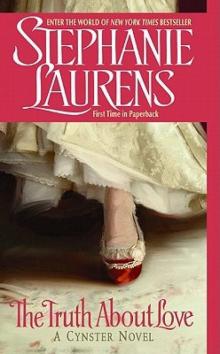 The Truth About Love
The Truth About Love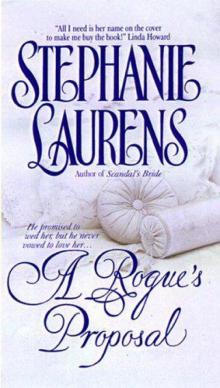 A Rogue's Proposal
A Rogue's Proposal The Elusive Bride
The Elusive Bride The Perfect Lover
The Perfect Lover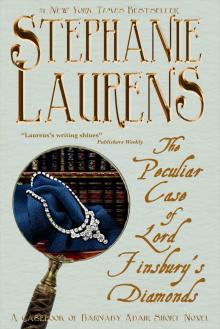 The Peculiar Case of Lord Finsbury's Diamonds: A Casebook of Barnaby Adair Short Novel
The Peculiar Case of Lord Finsbury's Diamonds: A Casebook of Barnaby Adair Short Novel The Lady Risks All
The Lady Risks All The Murder at Mandeville Hall: The Casebook of Barnaby Adair: Volume 7
The Murder at Mandeville Hall: The Casebook of Barnaby Adair: Volume 7 All About Passion
All About Passion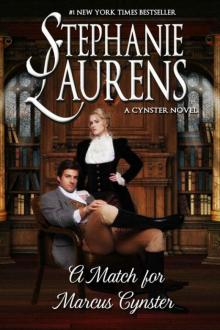 A Match for Marcus Cynster
A Match for Marcus Cynster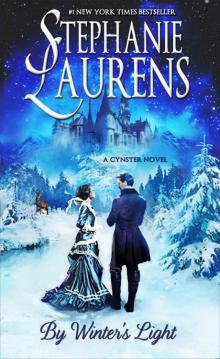 By Winter's Light: A Cynster Novel (Cynster Special Book 2)
By Winter's Light: A Cynster Novel (Cynster Special Book 2)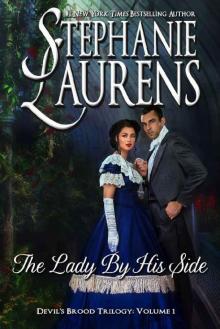 The Lady By His Side
The Lady By His Side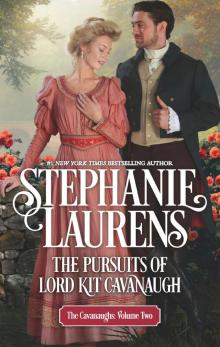 The Pursuits of Lord Kit Cavanaugh
The Pursuits of Lord Kit Cavanaugh Tangled Reins
Tangled Reins To Distraction
To Distraction A Rake's Vow
A Rake's Vow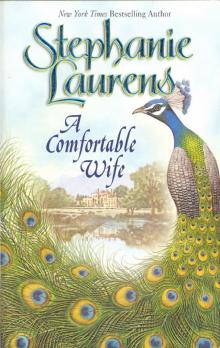 A Comfortable Wife
A Comfortable Wife A Lady of His Own bc-3
A Lady of His Own bc-3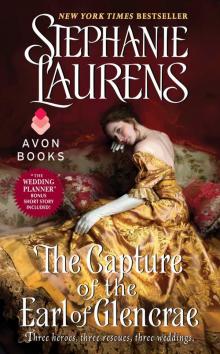 The Capture of the Earl of Glencrae
The Capture of the Earl of Glencrae Scandals Bride c-3
Scandals Bride c-3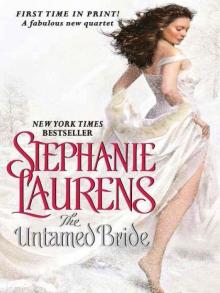 Untamed Bride
Untamed Bride The Brazen Bride
The Brazen Bride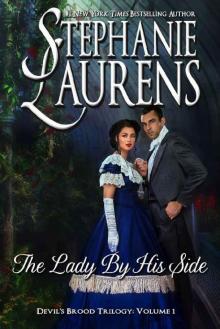 The Lady By His Side (Cynsters Next Generation Novels Book 4)
The Lady By His Side (Cynsters Next Generation Novels Book 4)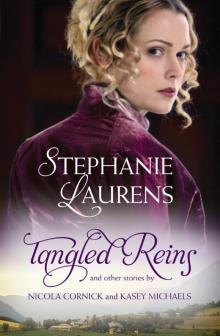 Tangled Reins and Other Stories
Tangled Reins and Other Stories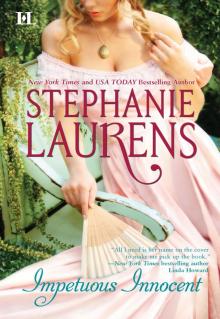 Impetuous Innocent
Impetuous Innocent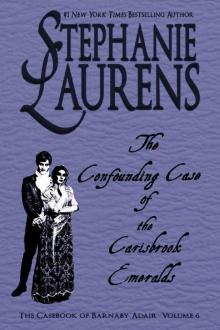 The Confounding Case Of The Carisbrook Emeralds
The Confounding Case Of The Carisbrook Emeralds Stephanie Laurens - B 6 Beyond Seduction
Stephanie Laurens - B 6 Beyond Seduction What Price Love?
What Price Love? A Fine Passion
A Fine Passion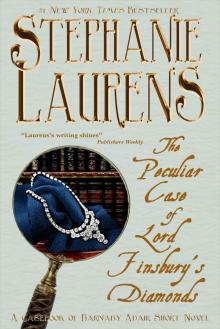 The Peculiar Case of Lord Finsbury's Diamonds: A Casebook of Barnaby Adair Short Novel (The Casebook of Barnaby Adair)
The Peculiar Case of Lord Finsbury's Diamonds: A Casebook of Barnaby Adair Short Novel (The Casebook of Barnaby Adair) Where the Heart Leads
Where the Heart Leads The Designs of Lord Randolph Cavanaugh
The Designs of Lord Randolph Cavanaugh A Secret Love c-5
A Secret Love c-5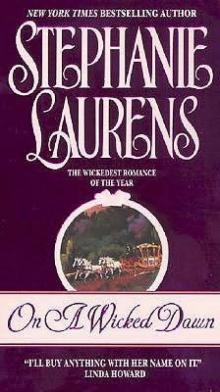 On a Wicked Dawn c-10
On a Wicked Dawn c-10 A Gentleman's Honor
A Gentleman's Honor THE LEGEND OF NIMWAY HALL_1750_JACQUELINE
THE LEGEND OF NIMWAY HALL_1750_JACQUELINE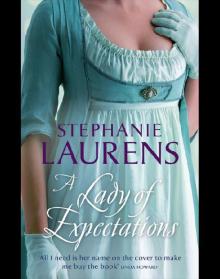 A Lady of Expectations
A Lady of Expectations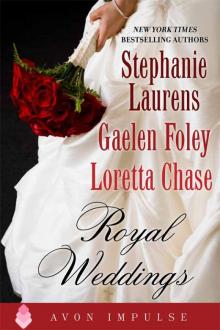 Royal Weddings: An Original Anthology
Royal Weddings: An Original Anthology The Ideal Bride (Cynster Novels)
The Ideal Bride (Cynster Novels) Mastered by Love
Mastered by Love A Buccaneer at Heart
A Buccaneer at Heart Captain Jack’s Woman / A Gentleman's Honor
Captain Jack’s Woman / A Gentleman's Honor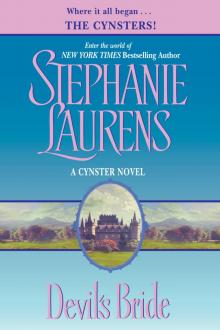 Devil's Bride with Bonus Material
Devil's Bride with Bonus Material A Lady of His Own
A Lady of His Own A Secret Love
A Secret Love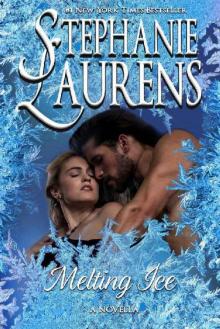 Melting Ice
Melting Ice Scandal's Bride
Scandal's Bride Lady Osbaldestone’s Christmas Goose
Lady Osbaldestone’s Christmas Goose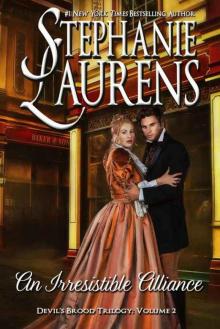 An Irresistible Alliance
An Irresistible Alliance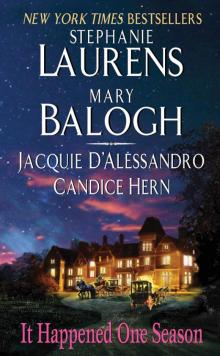 It Happened One Season
It Happened One Season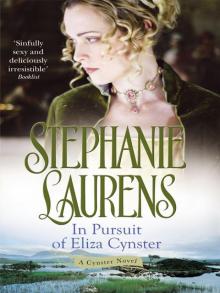 In Pursuit Of Eliza Cynster
In Pursuit Of Eliza Cynster Captain Jack's Woman
Captain Jack's Woman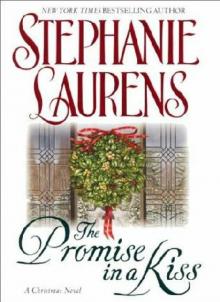 The promise in a kiss c-8
The promise in a kiss c-8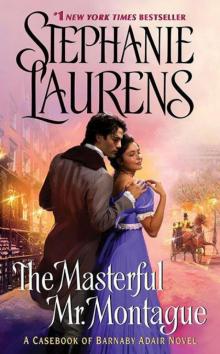 The Masterful Mr. Montague
The Masterful Mr. Montague The Lady Chosen
The Lady Chosen A Gentleman's Honor bc-2
A Gentleman's Honor bc-2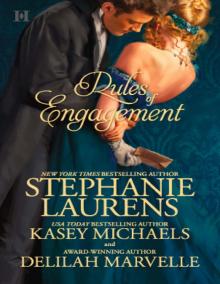 Rules of Engagement: The Reasons for MarriageThe Wedding PartyUnlaced (Lester Family)
Rules of Engagement: The Reasons for MarriageThe Wedding PartyUnlaced (Lester Family) Secrets of a Perfect Night
Secrets of a Perfect Night The Taste of Innocence
The Taste of Innocence On A Wicked Dawn
On A Wicked Dawn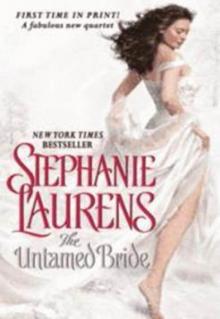 The Untamed Bride
The Untamed Bride A Rogues Proposal c-4
A Rogues Proposal c-4 Rakes Vow c-2
Rakes Vow c-2 Devils Bride c-1
Devils Bride c-1 Hero, Come Back
Hero, Come Back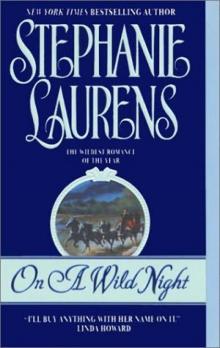 On a Wild Night c-8
On a Wild Night c-8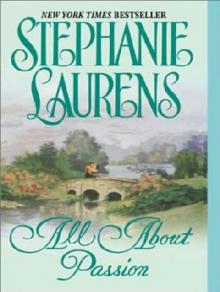 All About Passion c-7
All About Passion c-7